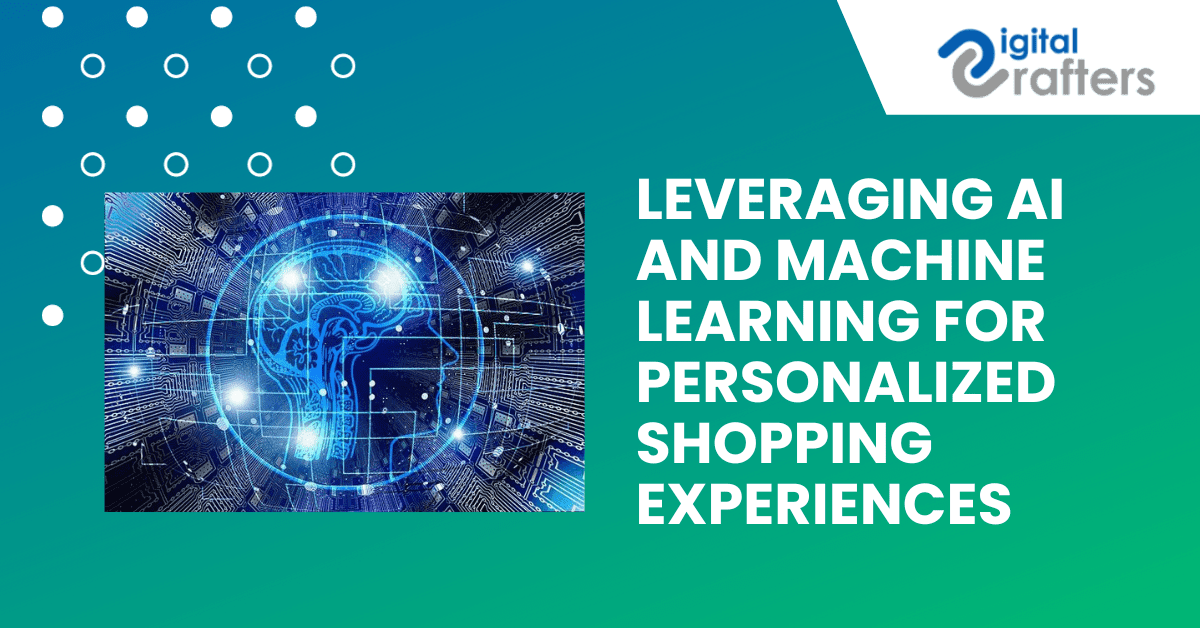
Statista estimates the market growth for an ecommerce business to have skyrocketed; global retail online sales reached an astounding $5.2 trillion by 2021 and are predicted to increase 56 percent by 2026; but when shopping on the Internet consumers face new challenges: choosing among all their options may cause confusion or discourage any purchase at all.
Today's competitive online retail environment requires retailers to deliver exceptional customer service that sets their company apart from similar businesses selling similar products. Failing to do this could result in customers abandoning your business altogether.
E-commerce retailers recognize this fact and have implemented personalized shopping experiences using Artificial Intelligence (AI) and Machine Learning (ML).
We will briefly outline how revolutionary artificial intelligence and Machine Learning tools have had an effectful role in eCommerce development solutions and can enhance each customer's shopping experience.
Start by understanding the value of tailoring online retailing to individual customer preferences.
What Does Personalization in E-commerce Mean?
In E-commerce, personalization means providing customized shopping experiences tailored specifically to a customer's preferences, habits, and purchasing history. Personalization may involve using data analytics (data) Artificial Intelligence (AI), and machine learning algorithms in order to better understand customers' needs and meet them across everything from specific brand messages on products offered for purchase, to services rendered.
PWC research showed that 73% of customers consider shopping experience an integral factor when making purchase decisions; second only to price and quality.
How are Artificial Intelligence (AI) and machine learning revolutionizing our buying patterns on the internet?
AI can accurately anticipate customer needs and behavior by tracking each step in their customer's journey and customizing experiences based on that journey - such as email recommendations for products/services/deals. Furthermore, this data-based analytics provides powerful insight.
Data-driven Analytics
AI Personalization allows businesses to analyze customer demographics, interests and buying habits to recommend content tailored specifically for increasing purchase behavior. Companies use this data when collecting such details directly from customers using AI Personalization analysis. AI helps ecommerce websites recognize profitable customers when these traits emerge; for instance, using this technique helps businesses understand customers' buying patterns by collecting demographic details like age or interests from past or recent transactions with them and using customized suggestions from AI Personalization as bait in encouraging the purchase behavior from potential new ones.
Customer Service
Enhance customer experience with AI assistants powered by voice activation technology, further personalizing it for each person's experience.
AI Chatbots and voice assistants help businesses enhance their personalization capabilities by analyzing customer preferences and data. This not only builds customer loyalty to online sellers but also provides seamless shopping experiences that increase overall satisfaction levels.
Artificial Intelligence offers smart product recommendations.
Artificial Intelligence uses customer patterns and forecasts to recommend products that best fulfill their requirements.
Studies revealed that 54 percent of internet retailers identified product recommendations as being key in determining order value. Sales conversion rates increased 4.5 times when these recommendations came directly from retailers - proof positive that personalized recommendations help make shopping experiences more successful!
AI machines and machine learning (ML) tools enable companies to generate personalized search results by tracking customer behavior related to how they search. Businesses then can produce tailored searches according to each customer's individual preferences and needs - yielding business results tailored precisely for every search request that arrives on customers' screens.
Marketing Campaign Optimization
Optimization plays a vital role in increasing customer satisfaction and loyalty, leading to higher revenues and sales for companies.
Marketing via email has revolutionized how businesses connect with customers, enabling users to design highly customized messages tailored specifically for every individual customer.
These e-commerce solutions utilize cutting-edge AI algorithms that track customer behavior and information. By doing this, online stores are able to present promotions, discounts and content specific to individual customers.
Entrepreneurial Benefits of AI-Based Ecommerce for Your Business
Machine learning offers e-commerce companies new strategies for providing an optimal shopping experience online for their customers. Through machine learning, these businesses are better able to understand customer requirements.
Increase Conversions
Conversion rates have significantly improved due to machine learning's capability of increasing conversions through optimizing search engines on websites, providing relevant product recommendations from online retailers and using AI for producing more efficient outcomes that match consumer patterns and habits.
Natural language processing allows customers to quickly identify what they're searching for by quickly searching product databases based on previous purchases and providing personalized recommendations based on past searches. Both methods quickly assist customers in quickly finding their target products.
24/7 Customer Support
Customers have access to Artificial Intelligence and personal assistant chatbots which respond authentically and human-like to customer queries using natural processing of language (NPL) or machine learning technologies, providing retailers with genuine responses similar to human ones for questions by their clients. Intelligent chatbots can offer 24/7 support regardless of time zone or geographical location and may support multiple languages - they also keep an overview of customer issues while giving insight into new trends.
Target Marketing
E-commerce platforms today collect vast quantities of customer and visitor data that marketers can utilize. Algorithms can then analyze this information to reveal topics likely to resonate with specific types of visitors to your website - providing marketers with valuable insight that allows for targeted segmentation to meet individual customers' preferences, tailoring marketing materials more precisely according to customer preferences.
Enhancing eCommerce Security
Artificial Intelligence and machine learning can detect suspicious or irregular behaviors without the aid of predefined rules, making AI and ML ideal tools to detect and prevent fraud. For eCommerce advanced ML methods using unsupervised learning models to analyze transaction data to spot fraudulent patterns can provide another layer of defense from fraudsters.
AI's pattern-detecting ability makes it faster at detecting fraud than traditional security tools; making decisions quickly in real-time while eliminating false positives (where an event that looks suspicious but actually is a legitimate transaction is flagged for examination), as well as helping recognize fraudsters more quickly.
Improved Supply Chain Management
Algorithms provide real-time data that allow companies to enhance their operations using algorithms that offer real-time analysis making processes more efficient. Machine learning algorithms are typically used in supply chains and logistics to monitor inventory levels and stock levels while monitoring customer demand to predict when goods must be ordered as well as any unexpected demands that might require purchasing sooner than anticipated.
Make more informed decisions
At the core of machine learning lies analysis. Understanding how information is processed and its impacts on your business is integral for fully harnessing its potential. An ideal algorithm has the power to quickly process large volumes of data so as to increase the capacity to make informed decisions faster than ever.
Improved Pricing and Inventory Management
Through machine learning (ML), retailers now have an effective means of dynamic pricing by studying hundreds of SKUs in detail and their variables. Artificial intelligence technology helps determine possible effects on sales before selecting an affordable price that aligns with business needs.
Dynamic pricing allows retailers to effectively manage inventory by making adjustments in response to changing customer demand (for instance air cooling units during heatwaves or stoves that burn wood in winter). This method ensures an even inventory while increasing sales.
Conclusion
ECommerce platforms that want to improve customer experiences by adopting personalization, machine learning and AI technologies could use them to revolutionize how their businesses run - providing superior service while increasing sales transactions at once.
Are You Searching for an ecommerce solutions provider to enhance your online store customization?
Check Out Digital Crafters Now! Digital Crafters provides seamless artificial intelligence integration solutions into business operations, creating many opportunities to boost both efficiency and growth.
